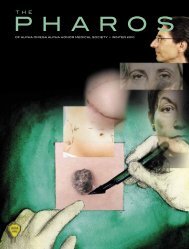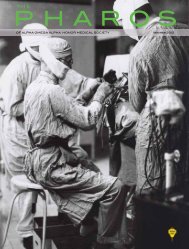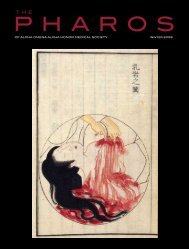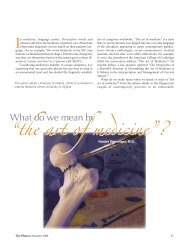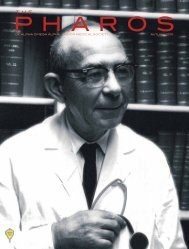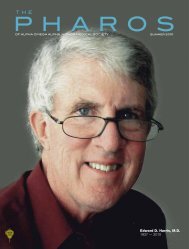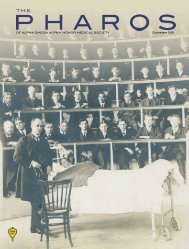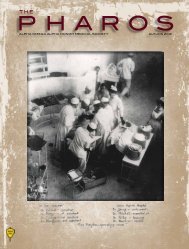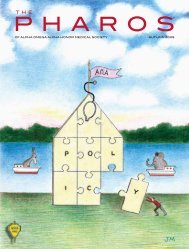Download The Pharos Winter 2008 Edition - Alpha Omega Alpha
Download The Pharos Winter 2008 Edition - Alpha Omega Alpha
Download The Pharos Winter 2008 Edition - Alpha Omega Alpha
You also want an ePaper? Increase the reach of your titles
YUMPU automatically turns print PDFs into web optimized ePapers that Google loves.
<strong>The</strong> smirk<br />
By and about Lori Soni<br />
During my undergraduate years<br />
I majored in Creative Writing at<br />
Northwestern University. <strong>The</strong> students<br />
in my organic chemistry class were<br />
very different from the students in my<br />
writing classes, and it was hard to believe<br />
we attended the same university. For a while it<br />
seemed that I would have to choose between a career<br />
in medicine or writing, but my English professor and<br />
Northwestern’s Triquarterly editor Reginald Gibbons<br />
came to my rescue. He made me realize that several<br />
physicians have pursued writing, there is harmony between<br />
the two professions, and that during my life one<br />
craft would sustain the other. To him I am eternally<br />
grateful.<br />
pain on her right side. Review of systems was normal and on<br />
physical exam she did not flinch when the doctor tapped her<br />
back in a test for pyelonephritis. Again, the doctor tapped her,<br />
and she complained of pain on her left side and pointed to the<br />
location.<br />
“I thought you said it was on the right—,” said Dr. Green.<br />
“I mean the right,” she said on second thought.<br />
<strong>The</strong> doctor had his doubts, but when he told the patient<br />
he would send her for an ultrasound, a strange smile flickered<br />
across her face. It was as though she was happy to be getting a<br />
test. Later on in his office, Dr. Green asked me what I thought<br />
she had.<br />
“Pyelonephritis,” I ventured.<br />
“Factitious disorder,” he responded.<br />
Having been fooled once, I quickly learned that it was okay<br />
to approach some patients with skepticism. Before we entered<br />
the room to see our next patient, Dr. Green glanced at the<br />
chart on the door. He clenched and unclenched his hands<br />
several times before taking a deep breath. <strong>The</strong>n, he whispered<br />
to me that the patient had a bad experience with a prostate<br />
biopsy a few months ago. Since then, Jon had been to see Dr.<br />
Green a few times and always with very vague complaints. Dr.<br />
Green gathered himself, pasted a smile on is face, and entered<br />
the patient’s room. As soon as I had walked through the door,<br />
I heard Jon say.<br />
“I’m not stalking you, Dr. Green. You know, right, that I’m<br />
not—” <strong>The</strong> patient glanced at me. “Dr. Green has been my<br />
doctor for fifteen years. Best doctor in town.”<br />
<strong>The</strong>n Jon began to complain. He had some vague discomfort<br />
in his abdomen. Sometimes it was in his chest. Sometimes<br />
it was all over his abdomen and chest. It wasn’t really a pain,<br />
but it was uncomfortable, and it had begun only after the<br />
prostate biopsy two months ago.<br />
“I am not a crybaby. It was an ungodly amount of pain they<br />
put me through. No one told me to expect. No one told me<br />
anything. And since then, I have not been myself.” Jon gesticulated<br />
with his hands as he spoke.<br />
He was a thin, athletic man with gray hair, and he wore<br />
a black T-shirt and khaki shorts. His biceps and calves were<br />
toned, his veins prominent, and his skin bronzed by the summer<br />
sun. He was the most fit, active, and healthy-looking patient<br />
I had seen all day.<br />
“Has your partner noticed any changes in you or the way<br />
you’ve been behaving?” asked Dr. Green.<br />
“Nooooo,” Jon replied.<br />
<strong>The</strong>n, Dr. Green asked if Jon was tired, lost weight, felt<br />
feverish, had chills, a change in bowel habits? No, no, no, and<br />
no. Jon was adamant that he had never felt better about himself,<br />
never felt better about life until his prostate biopsy five<br />
weeks ago. Again he insisted, “Could what I have right now be<br />
related to my biopsy?”<br />
I suppressed a sigh. It was my very first day. I had been told<br />
that I would see narcotics seekers, and the female patient I had<br />
just seen had factitious disorder, and now this. I had begun to<br />
ask myself when was I going to get to see the real patients.<br />
Throughout the interview Dr. Green was silent, typing<br />
away on Powerchart. <strong>The</strong> corners of his mouth were upturned<br />
ever so slightly. It was not the smile of a doctor talking to a<br />
patient. It was the smirk of a doctor talking to a hypochondriac.<br />
<strong>The</strong> doctor was not buying it. Jon knew it too. He began<br />
to fidget and speak with an annoyed tone. <strong>The</strong> pitch of Jon’s<br />
raspy voice went higher and higher.<br />
It is said that for poker players, everyone has a “tell.” A<br />
tense jaw, a finger tap, or a cough can give away a player’s<br />
innermost workings and thus reveal a particularly good or<br />
particularly bad set of cards. For Dr. Green, it was his smirk.<br />
It gave away his displeasure and allowed him to suppress his<br />
inner laugh. It was a busy day. He had already seen Jon a few<br />
times on the same matter. What about today would make Dr.<br />
Green more likely to help Jon? Vital signs and review of systems<br />
had been normal. Dr. Green gave Jon a gown.<br />
“Lori and I are going to step out for a few minutes. Take off<br />
your clothes. <strong>The</strong> opening goes in the back.”<br />
When we returned, Jon was babbling on and on about his<br />
prostate biopsy. Dr. Green listened as best as he could. It was<br />
really hard to take this patient seriously, but except for the<br />
smirk that kept reappearing, Dr. Green was doing a good job<br />
of listening.<br />
On physical exam there were no enlarged lymph nodes and<br />
the eyes, ears, and mouth all looked good. Heart sounds were<br />
normal. Lungs were clear to auscultation. Now it was time for<br />
the abdominal exam. No pain or tenderness was elicited on<br />
palpation. No hepatosplenomegaly. However, you could see his<br />
upper abdomen pulsating. <strong>The</strong> patient was a thin man and this<br />
is a common and normal finding in thin patients. His abdominal<br />
aorta did not feel enlarged. But in the upper quadrant just<br />
32 <strong>The</strong> <strong>Pharos</strong>/<strong>Winter</strong> <strong>2008</strong>



